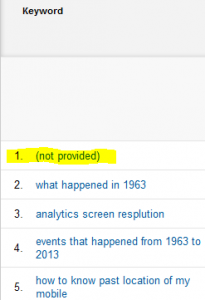There’s a good chance that (not provided) has been among your top keywords – if not #1 – for quite some time. Moving forward, it almost certainly will be.
“Thanks, Google!”
 First of all, I just want to say the sky is not falling.
First of all, I just want to say the sky is not falling.
That’s how it seems in some circles these days when people talk about Google’s decision not to pass along searchers’ keywords in the data it sends to websites when people click on any Google’s search engine results.
For years and years, this has been enormously valuable information for website administrators and marketers, who have used it to understand what search terms people are using to find their websites (and, for that matter, what searches aren’t sending them traffic) and to improve their site’s optimization for specific keywords that matter to them.
No more. Google moved recently to encrypt all searches, effectively shutting off the stream of keyword data that previously flowed to webmasters at the receiving end of search clicks. Google had been moving in this direction previously, defaulting logged-in users to encrypted searches; and as a result, many web managers and SEOs had already started to see “not provided” showing up as the most common search keyword for their sites. Search analysts have been expecting that Google eventually would make all searches encrypted; now the time has come.
What does that mean for web managers?
Now we’re hearing and reading all kinds of warnings from some marketers and SEO specialists, some suggesting this change will devastate their SEO efforts. I’ve even seen suggestions that small businesses, associations and non-profits should start to set up Google AdWords campaigns – that’s paid search marketing – just to continue having access to this data.
Well, that’s one approach. But if paying for search engine advertising wasn’t part of your marketing plans before, I really don’t think you should start spending that money just to get access to keyword info – especially if you’re a non-profit or association that owes it to members and donors to use their dollars responsibly.
So what do you use instead?
Fortunately, there are alternatives. The simplest is to continue using the keyword data you still receive from other search engines, and simply assume – or hope – that Google searchers aren’t any different from those who use Bing or other Google search competitors. That’s risky, though, because Google is absolutely dominant in the search industry; it controls far and away the largest number of searchers. If it turns out that Google searchers really do use different search terms to find your site than searchers elsewhere, then you’ll be making decisions based on bad data.
(By the way, if you have keyword analytics data dating back to when most Google searchers were not encrypted, you actually should be able to run comparisons to see if Google search terms bringing people to your site were different from other search engines. All you need to do is segment your data so you look separately at organic search traffic from Google, Bing, Yahoo and any other search engines that might have sent you significant amounts of traffic. You can then drill down to the keywords used within each of those isolated segments, and compare them. If you find that searchers from Google were using pretty much the same terms to find your site as those searching elsewhere, you might be comfortable making assumptions based only on non-Google keyword data moving forward. There’s still risk, of course; but it might work for you.)
A second option would be to rely on your on-site search keyword data – what terms people are searching for when they use your website’s internal search engine – to suggest what people might be searching for on Google. Your on-site search keywords provide fabulous insights for you as a marketer or website manager, and you already should be using them to understand your website visitors. But I don’t think they’re a good substitute for Google’s off-site search keyword data. Your on-site searchers include your best brand advocates, who know your organization and your website well enough to type your URL directly into their browser; it’s a good bet that these folks are inherently different from many of the people coming to you from Google.
What’s your best bet for good keyword data?
But here’s another option, which I like better: Filter your current traffic data so you’re looking only at organic (unpaid) search traffic that came in from Google. Then hone in further to look only at visits referred from Google that also used your website’s internal search. Do you see where this is going? What you’re looking for here are people who found your website through Google, but then performed another search – this time using your internal web site search engine – after they got to you. Once you’ve got your audience narrowed to that specific subset, you can look at the keywords these people used for searches conducted on your site.
Are these necessarily the same keywords that they used to find you on Google? No. But at least you are now able to see into the mind of the Google-referred visitor and find out what he or she is using as search terms within your site.
If you have an analytics package that’s sophisticated enough to have a really good traffic flow analysis, then you can narrow even further, and look specifically at visitors referred from Google organic search results who searched on your website immediately after arriving on your site. These are the people whose second page view on your site was your search results page (their first page view being the landing page they saw when they came in from Google). Again, it’s an imperfect science, but there’s a pretty good chance that these people are still searching for the same information they asked Google to find. This is rich keyword data that can provide a viable alternative to the data that Google has sent to you in the past.
Other alternatives?
So what do you think? Does that sound like a viable approach? It’s not a perfect world, and SEO’s not a perfect science. But I think this might be the best workaround for Google keyword data in the new world of Google secure search. Do you have other ideas? If so, I’d love to hear your thoughts and suggestions.

